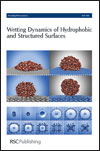Faraday Discussion 150: ‘Frontiers in Spectroscopy‘ took place in Basel, Switzerland from the 6th-8th April 2011.
Takeshi Oka from the University of Chicago gave an insightful introductory lecture on spectroscopy and astronomy commenting on how spectroscopy has grown hand-in-hand with astronomy. Session 1, focussing on precision spectroscopy and chaired by Gerard Meijer, got everything off to a good start and everyone quickly got into the swing of the unique way in which Faraday Discussions work! That evening we had a drinks reception at the Hotel Bildungszentrum 21 to accompany the poster session. With more than 80 posters on display it was a great turn-out and an electrifying atmosphere!

(Left) Stefan Willitsch and co at the poster session. (Centre and right) Glorious weather at lunchtime in the gardens at Hotel Bildungszentrum 21.
Thursday was an early start for the biomolecules session chaired by John Simons and included a fascinating conversation over ways in which gas-phase and condensed-phase scientists could work together. Another notable dialogue was between Klaas Wynne and Martina Havenith over her paper. We returned to the Hotel Bildungszentrum 21 for a lovely lunch in the garden before beginning session 3 on theoretical spectroscopy, chaired by Casey Hynes.

The large guild hall at Safran Zunft was a fantastic location for the concert and conference dinner.
The conference dinner was held at Safran Zunft and before the meal began we were treated to a concert of English and Italian duets blending the comic and tragic sides of love. The food was exceptional and after dinner the Faraday Loving Cup was circulated around the entire room. Mike Ashfold, the current President of the Faraday Division was sporting the spectacular badge of office and gave a tremendous speech despite claiming that ‘speeches weren’t his thing‘! The Skinner Poster Prize was awarded to Andreas Messmer, from Goethe-University, for his poster on structure determination of reactive catalyst-substrate complexes by 2D infrared spectroscopy.

(Left) Mike Ashfold giving his speech as President of the Faraday division at the conference dinner. (Centre) Takeshi Oka drinking from the Loving cup with Gerard Meije getting ready for his turn. (Right) FD150 scientific committee chair John Maier presenting the Skinner poster prize to Andreas Messmer.
Luckily Friday’s session on spectroscopy for dynamics, chaired by Mike Ashfold, wasn’t quite such an early start. John Muenter was keen to point out that David Nesbitt’s paper referenced his daughter’s PhD thesis! Martin Quack summed up the conference very thoroughly in his concluding remarks, stating that it was “by far the best organised meeting I’ve seen thanks to John Maier and the organising committee“. We think everyone who attended the conference would concur that John Maier and Stefan Willitsch, along with everyone else involved, certainly did a fantastic job.
Jennifer Newton and Tina Hodkinson
Keep an eye out for the published volume of this Faraday Discussion, which will be going online this summer – or sign-up to our free contents e-alerts to have Faraday Discussion 150 delivered straight to your inbox!
We welcome your ideas, contact Faraday Discussions with your topic proposal for a future Discussion













 Faraday Discussion 149: Analysis for Healthcare Diagnostics and Theranostics
Faraday Discussion 149: Analysis for Healthcare Diagnostics and Theranostics